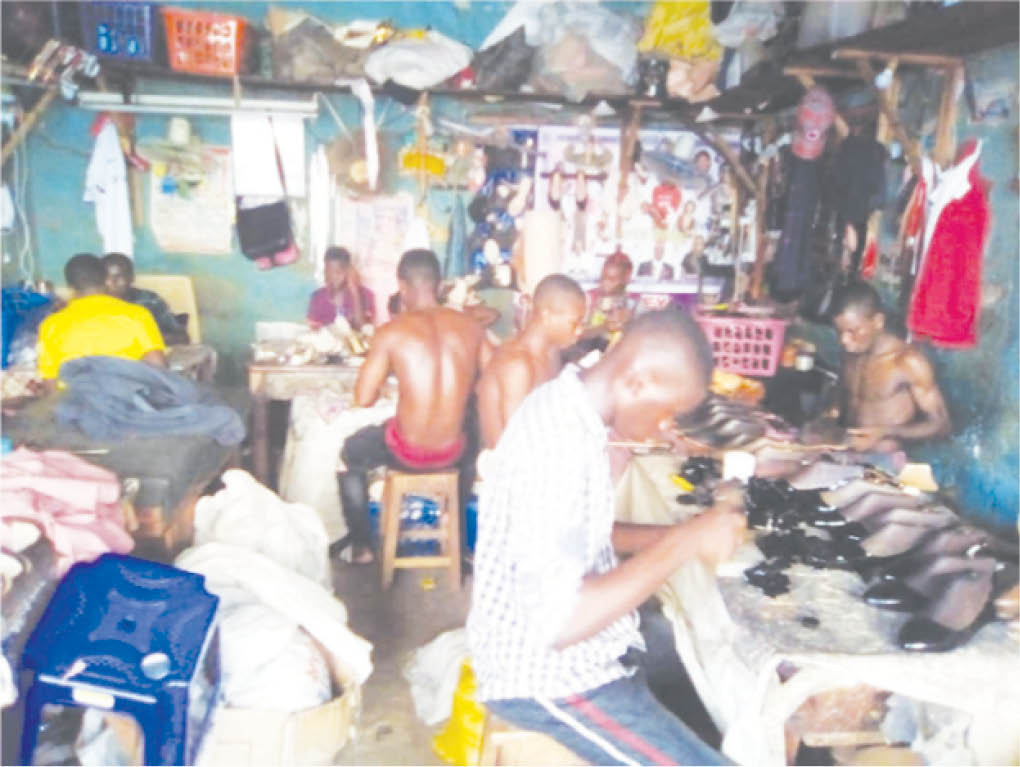Manufacturers of shoes, belts and bags in Aba, the industrial capital of Abia State, may be sent out of business if nothing is done urgently to address the scarcity of raw materials.
The Aba shoe industry is made up of clusters such as Powerline, Imo Avenue, Bakassi, Aba North Shoe Plaza, Omemma Traders and Workers, ATE Bag, Ochendo Industrial Market, and input suppliers, among others.
Our correspondent, who visited the industrial area, learnt that the Ariaria International Market has over 80,000 professional and enterprising shoemakers, as well as over 250,000 artisans engaged in the production of shoes and garments. They are further divided into sections, namely, production, marketing and transportation.
The about 80,000 shoemakers in the industrial city produce about one million pairs of shoes and slippers each week. An average of 48 million pairs is produced every year at an average price of N2,500, putting the market size at about N120 billion. This means the industry can feed 200 million Nigerians at the rate of N600 per day.
Also, dealers on raw materials such as leather, shoe soles, gum, fabric and other accessories, make good sales. Food vendors and others also compete for sales in the market.
Interestingly too, the trade is no longer for school dropouts and illiterates, as graduates are now actively engaged in it. Little wonder innovations are being introduced to the trade.
To produce a pair of shoes, a shoemaker needs processed leather, adhesives, fabrics, nails, dye, heel, fittings, decorative items, and finishing materials such as polish, lacre and waxes.
The President of the Shoe Manufacturing Association of the market, Mr Goodluck Joseph, who has over 30 years experience as a shoe manufacturer, said the COVID-19 pandemic has affected the availability of raw materials as fewer businessmen were able to import from China.
He said importers found it difficult to gain access to China to purchase raw materials and the few who could do that could only purchase very small quantity which was very expensive. He added that some importers deliberately inflate the price of the raw materials.
“Some manufacturers who placed order for materials online ended up getting substandard materials at the point of delivery of the goods. This has greatly affected the price of shoes, especially the production cost.
“We have variety of designs, and that determines the dozen price of the shoes. Initially, we were selling a covered shoe, whose sizes are between 10 to 40 at N800 per pair, but now it costs N1,200 to produce such shoes, while the big size that was N1,000 after production now goes for N1,500 per shoe. Ladies’ high heeled shoe that was sold for N1,000 before the COVID-19, now sells for N1,500 at dozen price,” he said.
He said patronage has drastically reduced because of the high cost of shoes in the market.
The Chairman of Powerline Shoe Manufacturers Association, Mr Godwin Nmeri, also noted that COVID-19 has affected the manufacturing industry.
He lamented that the 9.5 megawatt independent power plant commissioned by President Muhammadu Buhari in 2019 had stopped supplying light to shops and small businesses operating within Ariaria International Market. The plant built by a private consortium under the umbrella of Energising Economies Initiative (EEI) of the Rural Electrification Agency (REA) in Aba, Abia State was to supply electricity to up to 47,000 shops and small businesses operating at the market.
Nmeri said he spends thousands of naira fuelling his generator to produce shoes.
He added that the high cost of fuel, unstable electricity, and inability in gaining access to raw materials from outside the country, have forced some manufacturers to lay off some of their staff, noting that he has to let go of 18 workers as he was unable to pay them.

 Join Daily Trust WhatsApp Community For Quick Access To News and Happenings Around You.
Join Daily Trust WhatsApp Community For Quick Access To News and Happenings Around You.


